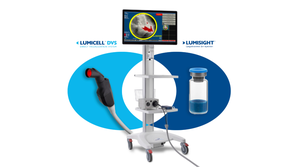The company, coming off the high of its COVID-19 testing success, is hoping for another win with its monkeypox diagnostic.

With over 26,500 confirmed cases in the United States alone, monkeypox continues its attack not only state-side, but also globally. And, according to the Centers for Disease Control and Prevention, virus eradication is unlikely. As monkeypox continues its assault, researchers are seeing virus mutations unlike the single-letter alterations they’ve become accustomed to in the SARS-CoV-2 genome. In some cases, entire genes of the monkeypox virus have vanished – a stretch of about 7% of the genome in one sample was missing, and another sample showed a part of the genome had been moved to an entirely different spot in the sequence. Researchers report that its too early to tell whether the mutations are beneficial, neutral, or harmful to the virus but note that if health officials detect an uptick in the number of virus samples carrying these mutations, it could signal they are helping the virus spread.
Secretary of Health and Human Services (HHS) issued a notice in August that monkeypox is or could have significant potential to be a public health emergency. The declaration prompted companies to use the FDA’s emergency use authorization (EUA) to put forth tools to help fight against the virus.
Abbott Molecular used the regulatory pathway in the development of its real-time monkeypox polymerase chain reaction test. The PCR test received EUA designation on Oct. 7, becoming the first commercial test kit to be authorized for the virus. The test, called the Alinity m MPXV test, uses lesion swab specimens from individuals suspected of monkeypox infection and is intended for use by “qualified and trained clinical laboratory personnel specifically instructed and trained in the techniques of PCR and in vitro diagnostic procedures and testing is limited to laboratories certified under the Clinical Laboratory Improvement Amendments of 1988 (CLIA), 42 U.S.C. §263a, that meet the requirements to perform moderate or high complexity tests.”
“Today’s actions underscore the FDA’s ongoing commitment to expand access to monkeypox testing, continue to work collaboratively with test developers, labs, and the CDC to encourage novel test development and facilitate access to safe and reliable tests that meet public health needs,” said Jeff Shuren, MD, JD, director of the FDA’s Center for Devices and Radiological Health.
This is not the first time Abbott has hedged its bets on its diagnostic division. In 2020 while most companies were feeling the sharp effects of the pandemic, Abbott was running on the high of a 40% growth in diagnostics due to the BinaxNOW test. Additionally, in the first quarter of 2022, the company reported $5.3 billion in diagnostics sales, including $3.3 billion in COVID-19-related testing sales – mostly from rapid tests.
Its up in air whether the monkeypox test will have a similar impact for the company, but the EUA approval of the test will be pivotal to expand access to individuals experiencing symptoms.
"Abbott received US FDA emergency use authorization for our molecular monkeypox PCR test," an Abbott represenative wrote in a statement to MD+DI. "The test will run on our fully automated Alinity m laboratory system."
About the Author(s)
You May Also Like




